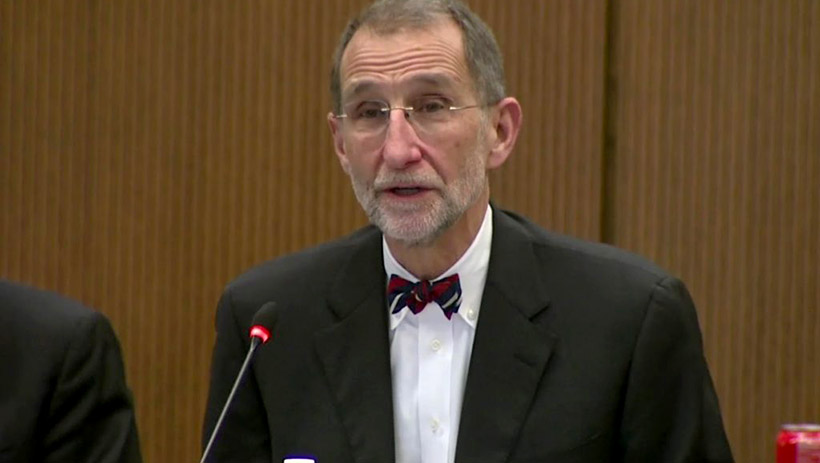Publisher's note: This post appears here courtesy of the Carolina Journal, and written by Kari Travis.
Dr. William Roper, interim president of the University of North Carolina System.
The University of North Carolina's Board of Governors is taking concerns over North Carolina's budget impasse straight to the General Assembly - in the form of a resolution asking lawmakers to quit stalling and pass an updated spending plan.
The board met Friday, Jan. 17, days after lawmakers failed to override Gov. Roy Cooper's veto of lawmakers' 2019-21 budget bill. That measure - stalled due to partisan disagreement over Medicaid expansion - included hundreds of millions of dollars for authorized construction and repairs across multiple UNC campuses, among other priority items.
Without a new budget, UNC's leaders are feeling major disappointment, UNC interim President Bill Roper said. The mood was pervasive throughout the board's Friday meeting. Several members voiced uncertainty about the fate of a cut-rate tuition program, various construction projects, and employee raises.
The legislature has dubbed UNC the "crown jewel" of North Carolina. But that regard isn't apparent in the political impasse that's now affecting the state's public higher education, Roper said.
"Please don't make this system collateral damage in a political standoff," Roper implored the legislature during his address to the full UNC board.
The board unanimously approved a resolution - crafted Thursday by the body's public affairs committee - listing multiple ways UNC will suffer if state leaders don't break their deadlock.
"The University of North Carolina strongly encourages all elected leaders who support and value the world-class higher educational systems in North Carolina to move swiftly to enact House Bill 966 and approve the provisions originally included in Senate Bill 354. Further, we call on all boards of trustees to create and approve a concurring resolution as soon as practical," the final paragraph of the resolution says.
No new budget means no extra money for enrollment growth, Roper said, a big concern for three schools operating under N.C. Promise, the budding, successful program that allows $500 per semester in-state tuition. Elizabeth City State University, UNC-Pembroke, and Western Carolina University will all feel pressure. While current and incoming students will continue to pay the cut-rate tuition, the three affected schools are worried about subsequent capital expansion and repair costs that now may be underfunded in the absence of a new budget.
Leaders at those universities are wondering how they'll cope, Roper told Carolina Journal during a news conference Friday. Roper noted he would meet Friday afternoon with the chancellors from ECSU, UNCP, and WCU.
Multiple campuses were counting on $630 million for authorized capital projects and $130 million for repair and renovation.
With that money, ECSU was scheduled to build a new library. WCU was planning a steam plant. East Carolina University had allocated money for a new building for the Brody School of Medicine. N.C. State University was planning a science building. Other planned renovation projects spanned Fayetteville State University, N.C. A&T, N.C. Central University, UNC-Charlotte, UNC-Greensboro, and UNC-Pembroke.
The N.C. School of Science and Math, which is expected to open a second
campus in Morganton in 2021, is also worried. Building costs are funded, but operational expenses are a concern.
Marty Kotis, the board member who initiated the resolution, said he hopes it's assertive enough to get lawmakers' attention.
"I wanted the wording to be aggressive," he told
CJ.
Consequences of a drawn-out budget impasse could be harsh for the economy, board member David Powers said Thursday. Powers pointed to Illinois, where a 793-day standoff forced several of that state's agencies to cut services or borrow money to stay afloat.
The Illinois impasse spawned 7,500 higher education-related jobs lost, including 4,900 direct jobs, a report from the Illinois Economic Policy Institute shows.
Upon request, Powers sent the report to
CJ on Friday morning, calling the statistics "very sobering."
Researchers from ILEPI and the University of Illinois collected and analyzed all state transactional data from the U.S. Census Bureau for the years spanning the Illinois budget impasse. During that time, public universities in the state saw huge drops in enrollment, the report says. Chicago State University laid off 40% of its employees in 2016. The fiscal strain on universities and colleges cost the Illinois economy nearly $1 billion each year.
Those are just a few of the negative outcomes researchers listed.
"We don't want Illinois to happen to North Carolina," Powers said.
The legislature is scheduled to return to Raleigh for its short session April 28. Senate Leader Phil Berger, R-Rockingham, has signaled the General Assembly is unlikely to take another stab at overturning Cooper's veto.
























